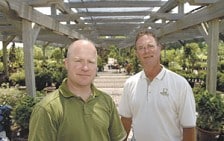Tree specialists see shift in consumer sustainability habits
Knowledgeable consumers tend to select plant life that is more conducive to Iowa's climate


Setting its sights on the residential market as commercial development wanes, Wright Outdoor Solutions Inc. is encouraging customers make more informed plant choices as it turns city trees into mulch.
Greening the environment goes hand in hand with the products and services offered by the company, which was formed in 2007 through the merger of Wright Tree Care Co. and Heard Gardens Ltd.
Focused on a continuum of care, the lifeblood of Wright Outdoor’s business revolves around planting, treating and removing native and non-native species of trees. One of the first companies in Iowa to be accredited by the Tree Care Industry Association, two of Wright Outdoor’s staffers – John Griffiths and Jason Brauckman – have earned Board-Certified Master Arborist designations from the International Society of Arboriculture (ISA).
Only 359 people in the world have achieved that level of certification, according to Rick Tagtow, executive director of the ISA’s Midwestern chapter. Of the 323 in the United States, only 12 board-certified tree specialists are located in the Midwest.
Wright Outdoor, which stresses that its landscape architects and tree care specialists are in tune with the latest techniques, has also noticed that consumers are becoming more adept in choosing plant life that is conducive to Iowa’s climate.
“I can remember 12 or 15 years ago, people’s idea of being sustainable was letting stuff grow naturally,” Griffiths said, adding that savvy shoppers are now selecting floras that requires less care. That translates into running fewer gas-powered trimming machines, lessening the need to burn fossil fuels.
“Nowadays, you don’t have to do that, because you can get the right plant material planted the first time,” he said. “It can maintain itself.”
Griffiths said locals also tend to shy away from trees such as Scotch pines and Austrian pines, both of which are evergreens. Those trees were popular here in the 1960s and 1970s, but the state’s high humidity and hot summers haven’t been kind to these species, which in such conditions are susceptible to insect infestations and disease.
“The good news is we don’t plant those two species much anymore,” Griffiths said. “So the need for pesticides in the environment goes down every year. I think that’s probably a good thing. The industry has done a pretty good job of educating the clients on pros and cons of different trees. I’m out every day, preaching the gospel of planting native species that have grown in Iowa for thousands of years.”
With a staff of nearly 80 employees – about 35 during winter – Wright Outdoor plants approximately 400 to 600 trees each year. In addition to the landscaping portion of its business, which includes installing rain gardens, bio-filters and ponds to reduce water runoff, the company recycles trees that succumb to sickness, storms or old age.
Bryan McGinness, president of Wright Outdoor, said some metropolitan-area municipalities, as well as nearly every independent tree-removal company in Greater Des Moines, avoid landfills by bringing fallen trees to be reprocessed into three grades of mulch at Wright Outdoor’s 16-acre site at 8000 Raccoon River Drive.
“We don’t grow our own trees here, but we do plant, we do nurture, we do maintain,” McGinness said. “Unfortunately, sometimes we have to remove (trees). And once we remove, we turn that into mulch. We kind of get the whole life cycle of a plant covered here.”
Prior to the recession, commercial-scale jobs made up nearly 40 percent of the landscaping side of Wright Outdoor’s business. Today, only 10 percent of its billings are attributable to commercial spaces. “You’d have to live under a rock to not see the articles that come out about businesses that have had to kind of change their model because of the lack of commercial work,” McGinness said.
But the inherently green company has a rose-colored outlook on its current customer base and revenue streams, according to Shane Churchill, Wright Outdoor’s director of operations.
“Every tree that’s taken down by the city of Des Moines, we recycle that wood into mulch,” Churchill said, noting that the Wright Outdoor produces approximately 25,000 yards of the organic material annually.
“It’s more volume, doing commercial work,” he said. “But the residential side, I believe, gets a little better service when there’s not so much commercial work out there, because we’ve got the time to dedicate to them and get to their projects sooner.”











